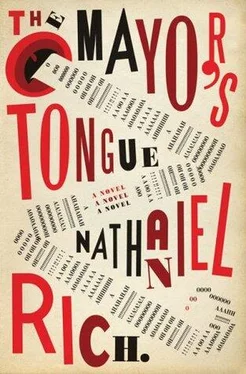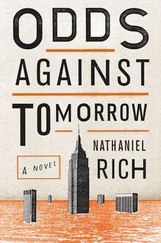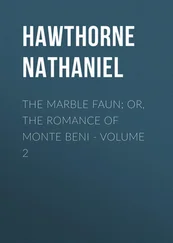"There were many people in the town's main street. I didn't recognize any of them, but they looked familiar, like distant relations. We had something in common, a wariness perhaps, only they were comfortable in this town and seemed to have lived there for a long time. I asked them where my boy was, and the people smiled at me with pity but said nothing. I started to panic.
"Their only suggestion was that I go see the Mayor. The Mayor was the only person in town who didn't live in those strange little red houses. He lived in a three-story mansion with bright white walls, stained-glass windows, and a tower that was topped by jagged battlements like bad teeth. To get to this mansion, you had to walk to the end of the town's single avenue, where there is a black iron gate. Once you pass through the gate, you walk down a long brick lane shaded by spruce trees. The mansion stands at the end of this lane, on top of the cliffs, and is usually cloaked in a streaming sea mist. When I approached, the only part of the house that was visible to me was a single window at the top of the tower. I had the feeling that someone was spying me from within. I remember holding my shawl close around me and wishing it was my boy's embrace."
Agata hugged herself tightly; far above the sweaty harbor the air in the lower Carso was flat and cool.
"As I got closer," said Stasia, "I heard a waltz, and the ground floor windows were moist and bright with golden light. The door swung open and there appeared an elderly butler with drooping features, wearing a starched tuxedo and swinging a gold-knobbed cane. There was a tea party under way, with many colorful characters seated in a tall, red-velvet-walled hall, around a long table piled with cookies and jams and scones and small steaks too — all sorts of things I had never seen before. A young maid scooted about with a kettle, refilling the teapots. A waltz was playing and several people danced. I studied each person's face for a sign of my love, but he was not there. The revelers were dressed as if for a costume party. There was one young man in a ratty pirate's shirt and torn slacks, who looked as if he had just rolled down a mountain, while another, wearing a natty pinstriped business suit and top hat, seemed to have come straight from the stock exchange. There was also an elephant hunter, a Turkish prostitute, and a young soldier with an eye patch. At the end of the table, there sat the host, the Mayor.
"He was a gigantic, frightening man built like a mountain, but everyone there seemed to adore him. He cracked jokes nonstop in a deep, gravelly voice and roared with drunken laughter. At one point, he took the businessman onto his lap and bounced him like a baby. The businessman didn't mind it all — in fact, he giggled and raised his hands like he was on a roller coaster."
Agata had lost herself in Stasia's story, and had ceased to worry about where she was being led, or what might be lurking within the darkness of the Carso. She just listened and tried to avoid tripping over the roots that knotted the steep mountain path. She tried to visualize the Mayor, but couldn't do better than a wide, blurry face.
"The butler tapped his cane on the floor, quieting the room. He introduced me by my name, which I do not remember telling him. The Mayor paused mid-bite, a piece of silverware immersed deep inside his mouth. Then a look of recognition came over him and he took me by the shoulders — I must not have stood much higher than his waist— and led me around the room, introducing me to the people there. They had incredible stories. At each introduction, the Mayor would say something like, 'This is George, an accomplished elephant hunter, who pined after a princess in a faraway land and embarked on a journey through terrible kingdoms and unfriendly landscapes to save her. George is one of my best friends.' Or, 'This woman of bewitching beauty is Aft, who caught the eye of a crippled American army lieutenant, suffering from blood poisoning after a botched surgery in a Budapest hospital shortly after the War. Her loving gaze gave the lieutenant hope, even in the final throes of his disease. She is one of my dearest, truest, friends. The lieutenant is as well.' Everyone there was one of his 'best,' 'oldest,' or 'most constant' friends. It was a happy gang all right, getting plastered together.
"After the introductions he said that he wanted to see me alone. He took me to a private study. As soon as we entered the room I began to cry. It was not the excitement or the newness of the place, or even my disorientation. No, I genuinely yearned for my boy, and my frustration was so great at not finding him that I couldn't behave myself anymore. When I had been with him, as briefly as it was, there had been a feeling of complete understanding. Everything had made sense, as if the universe had been shrunk down to a single pebble that could fit in my hand and be felt and measured and swallowed. Now I was floating debris, zigging through space, ignorant and blind."
Agata nodded sympathetically in the dark. The two girls had reached a clearing in the woods by a shivering, lily-blotted pond. Plane trees leaned into the water at uneven angles, silhouetted by the moonlight. The bushes droned with the nervous movements of dormice and hedgehogs. Stasia went over to the black pond and, with a deep sigh, leaned over and began to sip the cold water.
"Wait—" said Agata, "I have a water bottle."
"That's fine," replied Stasia. "I'm used to this. It doesn't get me sick one bit. No water ever does."
Agata took a cautious sip from her bottle and laughed quietly to herself at her situation. She realized she was exhausted. Stasia sat next to her, wiping her mouth with the back of her hand, the tips of her braids dangling wet. She helped Agata to her feet, and they set off again.
"I begged the Mayor to tell me, if he knew, where my boy was. He smiled and there was something like pride in his face. He said that the boy had left town, and that I was free to leave as well. The Mayor asked only that I stay for a week to see how I liked it. Most people, he said, enjoyed living in town and couldn't imagine anything worse than leaving and entering civilization. Then he put his arm around my shoulder, a bear paw that weighed me down. I was afraid not only of what might happen if I lost my boy, but also what might happen to me if I stayed there any longer. I did not want to find out anything more about the Mayor. His presence made me queasy.
"Outside the window of his mansion, at the bottom of the cliffs below, I saw a large city. I figured that's where my boy must have gone. I left in the middle of the night for the city, and I haven't been back to the Mayor's town since."
Agata and Stasia had arrived at a broad grassy hillside, terraced and hatched with vine-entangled trellises. The sky was already growing light to the east over Slovenia. Above them, at the top of the hill, was a wooden A-frame cabin. Its front wall was a single triangular window that overlooked the vineyard, the sparse woods, and the glossy bay beyond.
"If you're hungry like I am," said Stasia, "come with me." She tucked her body between the horizontal rails of the fence. Agata followed. They crouched low among the young vines, and when they believed themselves to be out of view of the cabin's triangular eye, they plopped down in the damp clover. They plucked clusters of underripe grapes, small and acrid, and ate them by the bunch, spitting out bits of pedicel. In the predawn dimness Stasia looked wan and unfocused. As she popped the grapes with her pointy teeth, flecks of juice appeared at the corners of her mouth.
Agata asked if they might rest for a minute before it got light again. Stasia seemed irritated, but assented. She did not move from where she was sitting, just mechanically leaned back into a supine position. Agata stretched out next to her, using her duffel bag as a pillow. She offered to share it, and Stasia scooted over, so that the two girls were lying side by side in the narrow clover between the rows of vines.
Читать дальше












